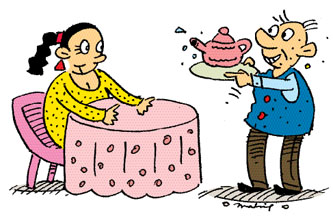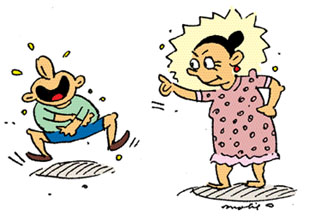Word Power
by R. S. Karunaratne
Types of mood
You write sentences for various purposes. Sometimes
you want to give information:
The tallest building is coming up in Dubai.
You also want to obtain information:
|

What do you prefer, tea or coffee? - Tea. |
Who built Thuparama?
At other times you write sentences to give an opinion, an order or to
make a promise or suggestion:
This is a good residential area to live. (opinion)
Get lost! (Go away) (order)
I will help you with the exercises. (promise)
Listen to BBC news. (suggestion)
When you use language for different purposes, the main clause is in a
particular mood. Be familiar with the three moods: The declarative mood,
the interrogative mood and the imperative mood.
Declarative mood
The declarative mood is used in the main clause when you want to make
statements.
Sangeetha is a promising actor.
Man is a rational animal.
Socrates was a philosopher.
I usually have breakfast at 8 a.m.
Gunadasa passed the exam easily.
The declarative mood can be used when you want to express an opinion.
He thinks Martin Wickramasinghe is a great novelist.
She should have told me where she was going.
William Shakespeare was a great dramatist.
'Aba' is a good film.
The declarative mood is used to make promises:
|

Stop laughing! |
I will give you financial support.
You can depend on me for your material needs.
The President's Fund will release Rs. 100,000 for the operation.
The company will give him a suitable job.
My uncle is there to help, whenever I need something.
Sometimes you can use "do, does" or "did" in front of a base form of
the verb to emphasize a statement.
Mother said, "I do love you."
Now she does look different.
I did attend your party. Can't you remember?
Note: The declarative mood is also known as the indicative mood.
Interrogative mood
The interrogative mood is generally used to ask questions. However,
there are two types of questions:
(i) Yes/No questions
(ii) "Wh" questions
(i) Yes/No Questions
In fact, these are questions which can be answered with "yes" or
"no."
Are you a teacher? - Yes.
Is she a dancer? - No.
Are you planning to go abroad? No, not immediately.
Could I speak to the manager? Yes, of course.
Are you a politician? - No, not at all.
Did you write the report? - No, I am busy.
(ii) "Wh" questions
When you ask a question using "why, where what, when, who," you
cannot expect a "yes" or "no" answer.
Why were you absent yesterday? - I was sick.
Where do you come from? - Matugama.
What do you prefer, tea or coffee? - Tea.
When can we meet? - Tomorrow.
Who is calling? - Your aunt.
Note: The interrogative "wh" question words are also known as
interrogative pronouns or interrogative adverbs.
Imperative mood
You can use the imperative mood when you want to give an order or
instructions.
Stop laughing!
Be quiet.
I want you to be here at 8 a.m.
Stir the mixture well.
Shut up!
The imperative mood is used to give advice or warn others.
Drive carefully.
Be vigilant all the time.
Don't move your head.
Mind your language
Anger and temper
Sri Lankan English speakers use "anger" and "temper"
indiscriminately. I heard an elderly man advising his son: "Try to
control your anger" The correct usage is "Try to control your temper."
Anger is a strong feeling of annoyance and hostility. You can
express, voice, or vent your anger.
It can also be used as a verb; the new measures adopted by them have
angered the public.
"Temper" is a state of the mind. You can be in a good or bad temper.
Sometimes our tempers rise, cool or flare. Therefore we must learn
how to control our temper.
Are you "annoyed" or "irritated"?
In a film review I found the following sentence: "People get annoyed
by the film's mindless violence."
If you see something unpleasant in a film or teledrama, you feel
irritated rather than annoyed. Scenes of violence tend to irritate us
because we can do nothing to stop them.
"Annoy" means to make somebody fairly angry: It annoys me when people
jump the queue.
"Irritate" is to make somebody angry: especially by something that is
done or happens continuosly.
Mosquito bites are sometimes irritating.
Another point
My boss always used to tell me: "There is also another point I want
to discuss with you." Here the term "also another" is non-standard. He
should have said: There is another point....
"Another" means an additional one of the same kind:
Would you like another cup of coffee? It can also mean a different
one: She has given birth to another baby.
As an indefinite pronoun "another" can mean an additional person or
thing.
I have received another letter from the same company.
Sometimes another means a different person or thing.
I don't like this pen, can you give me another?
Antique temple
Once a friend of mine invited me to visit an antique temple down
south.
When I went there I found a very old temple.
No doubt, antique means old and valuable. But it cannot be used with
buildings.
Some people collect antique jewellery and furniture. An antique shop
is one that sells antiques - the shop itself may not be old.
Any question?
After delivering a talk on "Socialism and Marxism", the speaker
asked: "Any question?"
"Any" is used with a plural countable noun, So, the speaker should
have said, "Any questions?"
Do not say: "Do you have any friend in the ministry?"
Say: "Do you have any friends...."
Don't say: "Do you know anyone of those standing at the gate"?
Say: Do you know any of those....
Rule: Before a phrase, use any. |
